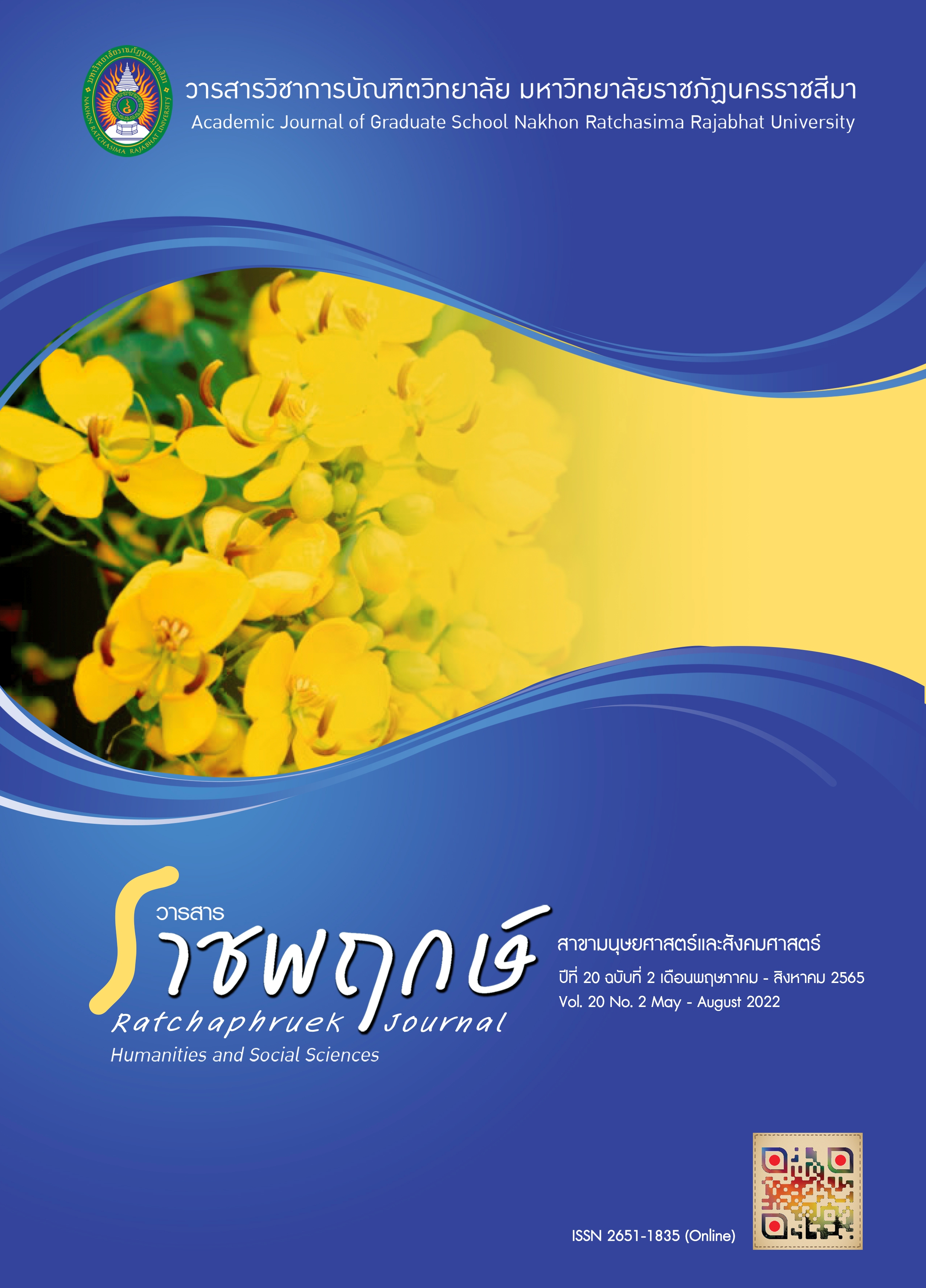Digital Game-Based Learning Management to Enhance English Vocabulary Skill and Collaborative Skill in 21st Century for High School Students
Main Article Content
Abstract
Nowadays, in the 21st century, various modern technologies have become a crucial part of our daily life, including education. The efficient ways in teaching English are enhancing vocabulary skills, choosing proper learning management, and using appropriate materials. This paper aims to: 1) Present the concepts and theories derived from the synthesis of digital game-based learning (DGBL); and 2) Present digital games that promote English vocabulary skills and collaborative skills for the secondary students. The study found that DGBL is related to the concepts of intrinsic motivation and the self-determination theory (SDT), which results in students’ active learning. In addition, DGBL relates to the zone of proximal development (ZPD), encouraging learners to develop their collaborative skills. The study of four digital; games, Kahoot, Vonder Go, Booklet, and Quizizz, found that each game had a common feature to increase students’ attention with fascinating pictures, colors, and sounds. Nevertheless, these digital games still have a limit in playing time and the number of word characters and players. Thus, teachers should study and try using digital games beforehand to keep teaching management smooth and create a good atmosphere in learning.
Article Details

This work is licensed under a Creative Commons Attribution-NonCommercial-NoDerivatives 4.0 International License.
References
กิตติภัฏ ชุณหวิริยะกุล. (2562). การอบรมเชิงปฏิบัติการหลักสูตร SPU Super Coach Super Growth. กรุงเทพฯ: มหาวิทยาลัยศรีปทุม.
เสาวภา วิชาดี และฟ้าสว่าง พัฒนะพิเชฐ. (2561). Enhancement of performance and motivation through application of digital games in an English language class. Teaching English with Technology, 18(1), น. 77-92. สืบค้นเมื่อ 9 กุมภาพันธ์ 2565, จาก https://files.eric.ed.gov/fulltext/EJ1170635.pdf
Burke, B. (2014). Gamify: How Gamification Motivates People to Do Extraordinary Things. Stamford: Gartner.
Cristyne, H. & Jennifer, J. (2019). Digital Game-Based Pedagogies: Developing Teaching Strategies for Game-Based Learning. The Journal of Interactive Technology & Pedagogy, 15(1), pp. 41-52. Retrieved February 8, 2022, from https://jitp.commons.gc.cuny.edu/digital-game-based-pedagogies-developing-teaching-strategies-for-game-based-learning/
Cuesta, L. (2020). Using Digital Games for Enhancing EFL Grammar and Vocabulary in Higher Education. International Journal of Emerging Technologies in Learning (iJET), 15(20), pp. 116-129. Retrieved October 14, 2021, from https://online-journals.org/index.php/i-jet/article/view/16159/8081
Leaning, M. (2015). A study of the use of games and gamification to enhance student engagement, experience, and achievement on a theory-based course of an undergraduate media degree. Journal of Media Practice, 16(2), pp. 155-170. Retrieved November 2, 2021, from https://www.tandfonline.com/doi/pdf/ 10.1080/14682753.2015.1041807?needAccess=true
Leslie, P., Ryan, B., James, A., Ben, J., Morgan, S. & Julie, M. (2019). Does motivation mediate the relationship between competence perceptions and patient outcomes among individuals with chronic low back pain? A multiple mediation analysis. Disability and Rehabilitation, 43(7), pp. 953-959. Retrieved December 22, 2021, from https://doi.org/10.1080/09638288.2019. 1643421
McLeod, A. (2014). Lev Vygotsky. Retrieved September 9, 2021, from https://www. simplypsychology.org/vygotsky.html
Peterson, M. (2012). Language learner interaction in a massively multiplayer online role-playing games. Basingstoke: Palgrave Macmillan.
Prensky, M. (2001). Fun, play and games: What makes games engaging? Digital game-based learning. New York: McGraw-Hill.
Ryan, R. & Deci, E. (2017). Self-determination theory. New York: Guilford Publication.
Saniago, D. & Tira, F. (2019). The Principles and the Teaching of English Vocabulary: A Review. Journal of English Teaching, 5(1), pp. 15-25. Retrieved February 5, 2021, from http://ejournal.uki.ac.id/index.php/jet/article/view/956/787
Witcomb, C. & Schoning, M. (2017). This is the one skill your child needs for the jobs of the future. Retrieved October 2, 2021, from https://www.weforum .org/agenda/2017/09/skills-children-need-work-future-play-lego/#:~:text=This%20should%20be%20cause%20for,the%20Future%20of%20Jobs%20Report.


